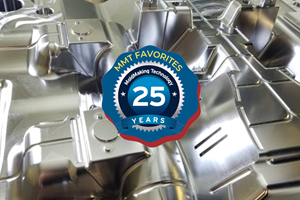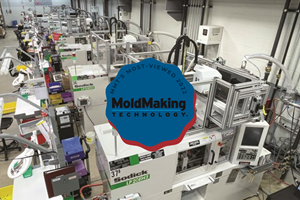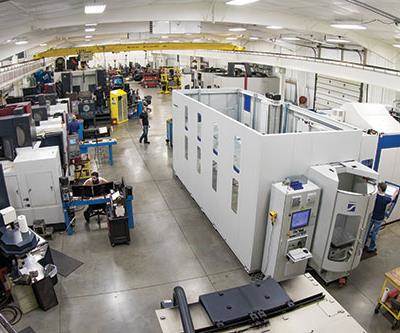2016 Leadtime Leader Awards Winner: Krieger Craftsmen
This mold manufacturer was rebuilt with an emphasis on core values and a “productionized” moldmaking strategy designed to reduce lead times.
When Tim Krieger, founder and president of Krieger Craftsmen Inc., in Grand Rapids, Michigan, found out that his company had won this year’s Leadtime Leader Award, he immediately felt reassured that his years of efforts had paid off. But to speak with him, as he surveys what he has built and the people he leads, one gets the impression that he is also both humbled and proud to be recognized.
“When it comes down to it, I’ve been fortunate to have put together the right people with the right equipment in a safe, positive work environment,” Krieger says.
That work environment for this injection mold manufacturer is a 32,000-square-foot facility that is laid out with streamlined production in mind, as well as room to grow. Thirty employees, including interns, work together like, as Krieger puts it, a well-oiled machine, taking projects from design to assembly.
The company was first established in 1993 by Krieger, who at the time worked solo as “Tim Krieger, Craftsman,” repairing molds out of his garage. “The size limitation was whatever would fit into the trunk of my Riviera,” he says. After hiring three employees so that he could add mold design and building services, he changed the name to the plural Krieger Craftsmen, and in 1995 moved the company to a free-standing 5,000-square-foot building. “We thought we were in heaven with all of the extra space,” he laughs. Krieger Craftsmen continued to grow to 15 employees, and in 2006 had to rent an additional 4,000 square feet in the building next door to house the moldmaking and assembly operations. The company had 25 employees by the summer of 2008 and was quite busy, but complications from a failed partnership would force the company into a critical downward turn and leave Krieger with a huge choice to make: sink or swim. He chose to swim.
“I was in terrible debt, and my prospects weren’t looking very good,” he says. “I refused to file bankruptcy. I was determined to make good, and I met with every supplier I owed to try to persuade them to have faith that I would not only settle up with them, but give them new business once I’d righted the ship. I couldn’t throw in the towel without trying and I worked relentlessly to rebuild.”
In October 2009, Krieger introduced a new management team that would help lead the company to profitability. “This team shares the same fundamental philosophies that I had from the beginning: integrity, honesty and quality,” Krieger says. “They also share a vision, and that is to make Krieger Craftsmen a world-class company that anyone would want to do business with.” In particular, Krieger credits his general manager, Durbin Haas, as well as a few other key people that hung in there with him during the tough times, for helping to establish a skilled crew that is ready for the unexpected, and works to maintain rigorous inspection and quality controls.
In 2012, almost exactly three years after he began “righting the ship,” Krieger bought a larger, 32,000-square-foot building located next door, and today the company owns both buildings on six industrial acres, where it manufactures molds for the automotive, medical, consumer products and aerospace industries. Among the shop’s specialties are molds for front and rear automotive lighting, including those with complex optics such as reflex, Fresnel and pillow lenses. Krieger’s team is also proficient in building applique, gas-assist, unscrewing, two-shot and multi-color tooling, and the company is looking to further expand its market reach with mold-in-color and stack molds. Value-added services include full sampling and validation, providing setup parameters for mold installation, and dispatch of moldmakers and engineering services to customers in emergency situations in order to expedite repairs and get molds back into production more quickly. In-house laser welding, A-1 diamond polishing and a local reflex/electroform supplier are also offered.
Krieger says his team is always looking for ways to improve designs in order to produce the most cost-effective and robust molds. “We expedite a thorough design-review process that includes working with the customer up front to correct poor steel conditions, bad draft situations and other undesirable tooling conditions,” he says. “Oftentimes, working with the customer, we will modify the part in-house to expedite this process in order to ensure the customer’s part requirements are met while also maximizing our time to manufacture the mold.”
By week two of a job, regardless of how many weeks the job will take, the project is typically in the machine roughing stage while the company’s project managers are implementing the inevitable last-minute customer part/design changes. Daily “huddle” meetings are held with project leaders to review job scheduling, job status and quotations. The quality-control procedures in place include detailed, weekly updates and progress photos that are provided to customers throughout the tool-build process. This is instrumental in keeping the customer informed and “our finger on the pulse,” Krieger says.
“Productionized” Moldmaking
Lead times for the molds Krieger Craftsmen builds average about eight to nine weeks, down from 12-14 weeks just a few years ago, and over the last year the shop has maintained a 98-plus-percent on-time delivery record, Krieger says. “We responded to customer requests for faster delivery with better planning and organization, extensive fixturing and tooling for better processes, five-axis machining, larger capacity toolchangers for longer cycle times and unattended operation, and an automatic pallet changer that is configured for expansion.”
“We approach moldmaking as production. Every mold, although customized to the part geometry and shape, still has the same components to it, such as slides, lifters, retractors, cavities, cores, etc. Some may be mechanical and some hydraulic, but all molds share the same or similar characteristics. By approaching the process of making these components with this production mindset and using the latest technologies to do it, we’ve literally ‘productionized’ mold manufacturing.”
Krieger believes that staying current with technology is central to achieving success and to reducing lead times. To that end, the shop was recently equipped with four 5-ton overhead crane systems that can move molds and other heavy tooling and equipment more efficiently through the facility. A Kennametal ToolBoss vending machine for dispensing carbide drills, cutter bodies, replacement inserts and other perishable tooling helps to keep production running 24 hours without interruption. The system notifies the supplier via the internet when any of the tooling is approaching a preset minimum (and maximum) inventory. “You don’t want to sit on too much inventory, but you obviously need to have enough,” Krieger says. The vending system is also integrated with the company’s Shoptech E2 enterprise resource planning system, which helps track job costs.
The company also has a well-equipped tool crib containing spare parts for emergency mold repairs, including a range of ejector pins and bushings, manifold components, replacement water fittings and hydraulic components. According to Haas, all of the shop’s moldmakers are trained to troubleshoot manifold systems and rewire them.
But to truly move toward “productionizing” moldmaking, Krieger invested in a five-axis Grob G550 universal CNC horizontal machining center offering 30,000-rpm spindle speeds and 1,000-psi through-spindle coolant capabilities. The machine is also equipped with an integrated and expandable Schuler LoadMaster robotic 10-pallet changing system. “This machine has become the cornerstone of our productionized mold manufacturing process,” Krieger says. “It’s a production powerhouse.”
The choice of this machine was not necessarily an obvious one, however. After seeing a smaller G350 in Grob’s booth at IMTS 2014, Krieger visited the machine builder’s Ohio facility and saw an automated production line consisting of 10 machines that was being configured for Ford. “I’m looking at this robotic lineup of machines, and thinking this just reinforces what I had been envisioning for so long. Why can’t we do this for molds?” he says. “Technology has evolved so far and so fast, so why can’t we take a raw block, put it in a machine and get a finished workpiece at the end?
“I could imagine what some of my colleagues were thinking. They would say, ‘Grob machines are designed for high-production manufacturing.’ And I would reply, ‘Exactly. They run 24/7 for years. Isn’t productionizing mold building what we’ve been talking about doing for the last decade or longer?’”
Krieger says the Grob is the first truly robotic, automated work cell in his company’s arsenal, enabling his machinists to machine all five sides of a workpiece in one setup using its 120-position toolchanger. It’s the beginning of the productionized mold manufacturing system that he is building into his operations using Grob technology. In fact, he has already poured the foundation for a second machine.
This machine, as well as 11 others of various types and brands, are all equipped with Single Source Technology’s FCS modular clamping system, used to position a workpiece within the machine tool so that as many as five sides can be machined in one setup. This fixturing system is a game-changer for both Krieger Craftsmen and its customers, Krieger says, because it helps deliver shortened lead times by reducing setup times and enabling lights-out machining, while still maintaining high quality and accuracy.
To support its engineering capabilities, the shop is furnished with seven CAM stations using Vero Software’s WorkNC, and all machinists program on the floor, which aids in reducing lead times. Additionally, all moldmakers use the company’s 13 machine-side CAD stations equipped with Vero’s Visi software to view and measure what they are building. Krieger says this further reduces mold-building time and costs.
Views on Teamwork and Company Culture
Krieger Craftsmen focuses on hiring employees with a good work ethic, who are ambitious and who always strive to improve, both individually and as part of a team. Training and cross-training, along with a certified apprentice program, foster continued growth. Currently, the company’s ratio of apprentices to journeymen moldmakers stands at 1-to-3.
“We have an open-door policy,” Haas says. “We want our employees to feel comfortable with sharing opinions and ideas for improvement; we believe that communication and building a team-oriented environment increase good attitudes among employees. ‘Team management’ is not just a catch phrase at Krieger Craftsmen, but a way of life that is deeply imbedded in our culture.”
The majority of the company’s new hires are referred by existing employees, Krieger says, which “tells us that we must be doing a lot of things right. When at all possible, we always like to promote from within, and this helps to keep turnover very low.”
In addition to staying current with machine technologies and employee training, Krieger says he has made a point to create a workplace that is healthy for both mind and body. For example, four large environmental-control units installed in the shop not only filter, heat and cool the plant, but also automatically sense air quality and introduce as much as 25-percent fresh air when needed for a cleaner, healthier working atmosphere. The facility is well-lit with LED lighting throughout; and lift trucks are electrically powered to prevent propane fumes from polluting the workplace.
For employee comfort and enjoyment, Krieger Craftsmen offers an updated kitchen/break room that is bright and spacious, and a “tranquility area,” a patio with a fireplace, waterfall and built-in gas grill and outdoor kitchen that is used for family picnics and company events.
One of the questions on the Leadtime Leader Awards questionnaire is “What makes your company unique?” When Krieger asked his employees to answer the question themselves, anonymously, he says he was moved by the breadth of positive feedback. “When we asked them to answer the question, we didn’t tell them what to say or how to say it. We just told them to be honest. Good or bad, we wanted to know,” he says. Their responses reflect a team that is happy with and appreciative of the culture and environment he has created. “We take care of our people so our people will take care of us,” he says. Here is just a sampling of the employee comments:
• “Krieger Craftsmen is unique because it is a shop that produces an excellent product while enjoying the fellowship of teamwork.”
• “Finally, an owner that likes input and has an open-door policy.”
• “We combine great technology with people who have great skills. A fun and exciting atmosphere to work in. When we put it all together we can do amazing things.”
• “Everyone helps everyone. I have learned more working at Krieger Craftsmen than I will anywhere else. We are all helping to make everyone better at what they do.”
Krieger Craftsmen’s philosophy has always been “to make a little for a long time.” Krieger believes that repeat business and customer satisfaction and retention aren’t just goals, they’re the foundation of the business. “You must engage in the technology in order to succeed today. You have to learn and grow and train and develop,” he says. “It’s not one thing; it’s the combination of all of them.”
Related Content
Leading Mold Manufacturers Share Best Practices for Improving Efficiency
Precise Tooling Solutions, X-Cell Tool and Mold, M&M Tool and Mold, Ameritech Die & Mold, and Cavalier Tool & Manufacturing, sit down for a fast-paced Q&A focused on strategies for improving efficiencies across their operations.
Read MoreMMT Chats: Acquisition Trends and Lessons for Mold Builders
Jim Berklas is a former full-time M&A lawyer for several of the largest private equity firms in the country and has 25 years of M&A experience and 200 closed transaction. Today, he is founder and M&A Leader with Augmented Industry Services. He joins me for this MMT Chat on mergers and acquisitions trends and strategies within in the mold manufacturing industry. This episode is brought to you by ISCAR with New Ideas for Machining Intelligently.
Read MoreMold Builder Uses Counter-Intuitive Approach for Mold Challenges
Matrix Tool Inc. answers customers’ hard questions with creative solutions for cavity spacing, tool sizing, runner layout and melt delivery that reveal the benefits of running in a smaller press size at lower cavitation but higher yield.
Read MoreSteps for Determining Better Mold Prices
Improving your mold pricing requires a deeper understanding of your business.
Read MoreRead Next
Krieger Craftsmen Rebuilds Culture to Drive Success
After weathering the 2009 recession, the company instituted steps toward a more positive company culture that translated into increased profitability.
Read MoreAre You a Moldmaker Considering 3D Printing? Consider the 3D Printing Workshop at NPE2024
Presentations will cover 3D printing for mold tooling, material innovation, product development, bridge production and full-scale, high-volume additive manufacturing.
Read MoreHow to Use Continuing Education to Remain Competitive in Moldmaking
Continued training helps moldmakers make tooling decisions and properly use the latest cutting tool to efficiently machine high-quality molds.
Read More

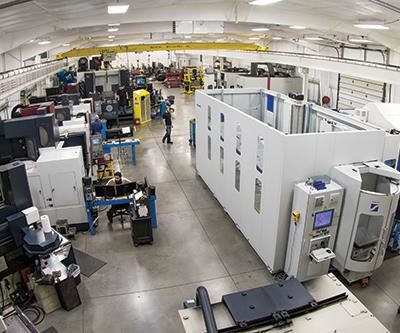
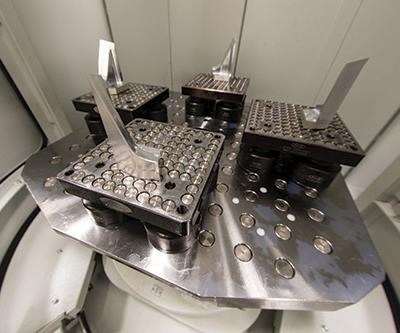
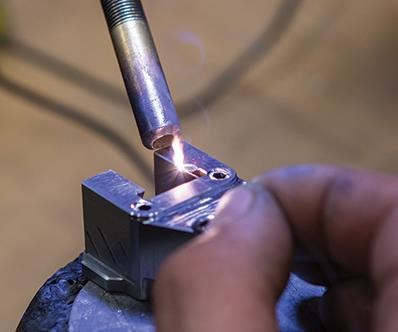
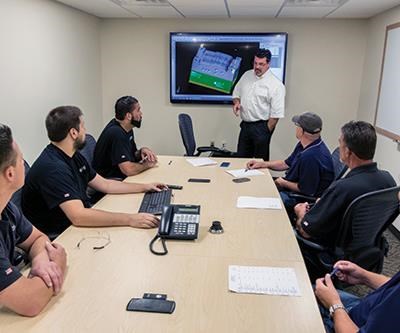
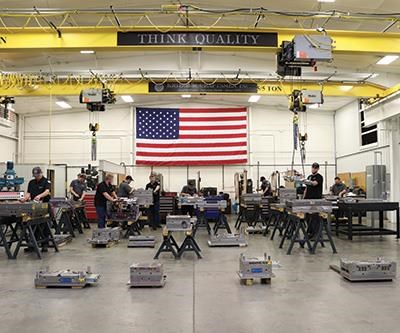
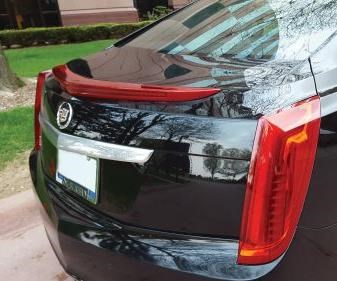
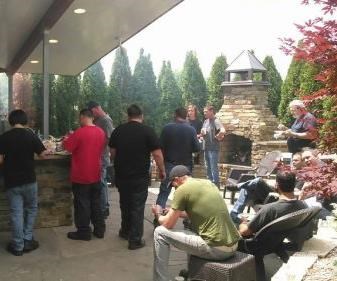
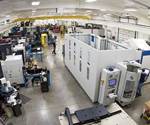











.jpg;maxWidth=300;quality=90)








